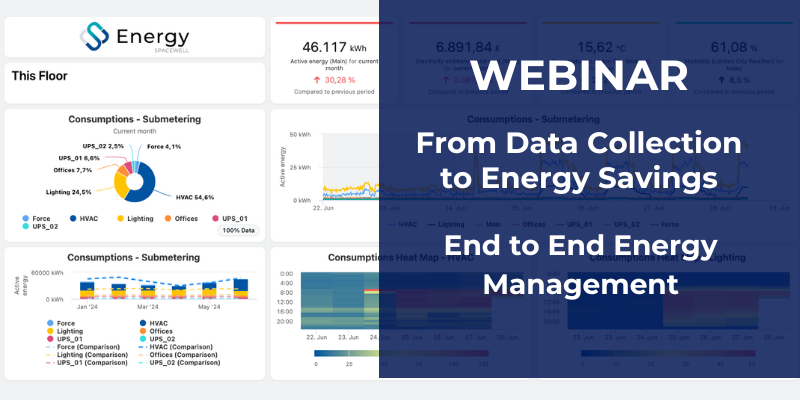As Energy Management becomes more important for businesses of any kind, understanding the various technologies that drive energy management is an important step to get started. These technologies not only help in optimising energy use but also play a significant role in reducing costs and enhancing sustainability.
We have recorded a webinar to demonstrate how monitoring energy can be easy and can deliver results in an easy and smooth manner.
Energy Management Systems
The software where you can centralise, monitor and analyse your energy data is key to making informed decisions about your energy savings strategy. It helps you track, compare and identify areas of improvement. And it also allows you to report and show information clearly to your organisation or stakeholders.
However, the EMS doesn’t work alone. It needs information to do its job. Such information can be retrieved from endless sources, including sensors, fiscal meters, data hubs, other building software like BAS or excel sheets. And in this article we focus on one in particular: energy monitoring hardware.
IoT and Smart Energy Management
Hardware in itself is not new, fiscal meters have existed for a while. However, modern devices and IoT sensors can monitor and control energy consumption in real-time, providing valuable insights and automating processes to improve efficiency.
Smart meters, sensors, and connected devices work together to create a comprehensive energy management ecosystem. This technology, together with the EMS, allows for precise tracking of energy consumption, identification of inefficiencies, and implementation of corrective measures, leading to energy and cost savings. The results are achieved by combining quality data with precise monitoring and analysis capability.
Return on Investment and Cost Considerations
Implementing energy management technology involves initial investment costs, but the long-term benefits often outweigh these expenses. Cost considerations include the price of hardware, software, installation, and ongoing maintenance. However, the time between starting your project and first results is short. The return on investment (ROI) can be significant due to reduced energy bills, improved operational efficiency, and potential incentives or rebates for adopting energy-efficient technologies.
In this webinar you will see how to approach energy management, and how your providers can become your allies. You will be able to see that the cost of entry isn’t necessarily high, and that getting started can be smooth if you have the right partners along the way. Then you can start analysing your energy consumption right away.
Join us and IoT Specialist Pressac to talk about this hardware and software combination and much more on the recording.




